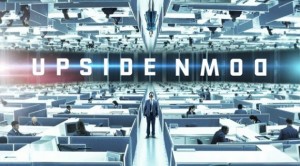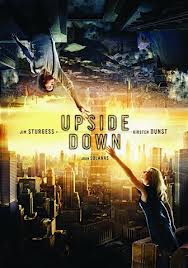Upside Down
Posted on March 14, 2013 at 10:48 pm
 Argentinean writer-director Juan Solanas has created a work of bracingly singular imagination that is sheer visual pleasure, with some mind-bending ideas and a deeply romantic sensibility.
Argentinean writer-director Juan Solanas has created a work of bracingly singular imagination that is sheer visual pleasure, with some mind-bending ideas and a deeply romantic sensibility.
We are told by Adam (Jim Sturgess) that throughout the universe, there is only one solar system with “dual gravity.” He lives in the “down” side of mirror-image parallel worlds. Interaction between the two worlds is strictly forbidden, with the exception of a tightly controlled transfer of energy by a vast, soulless, and predatory corporation. The laws of physics in this world also impose a barrier. Matter from one side quickly heats up and burns when it is placed in the other. People carry their gravitational pull with them, so that anyone who visits the other side will give themselves away by floating back toward their home turf.
Adam was orphaned following an industrial accident. His only family is his Aunt Becky, who sends him into the mountains to gather a very rare pink bee pollen that stands out in the wintry gray and blue of the bleached-out color scheme. On the highest peak, he glimpses a girl named Eden Moore (Kirsten Dunst) in the mountains of the up world. They are close enough to talk to each other. Within a few years, they are in love. He pulls her down on a rope and with her back up against a protruding crag to keep her from floating back up, they kiss.
But they are tracked down and she is badly hurt trying to escape. Ten years later, Adam learns that Eden has survived the accident and works for the corporation. He has to find her again. But it turns out the totalitarian regime and gravitational barriers are not their biggest obstacles.
Solanas has created two worlds of vast and stunningly intricate detail. Identical desks extend endlessly across both floor and ceiling in cavernous offices. Eden likes to drink upside-down cocktails, blue liquid served in a stem-up glass and slurped from below. And the consequences of reverse gravity are imaginatively (if not always consistently) explored. Adam remembers to use hairspray to help him pass as a top world resident, to make sure that his hair won’t hang the wrong way (up instead of down) when he goes to see Eden. But when he hides out in the men’s room, he does not think about the fact that his pee will hit the ceiling, not the urinal. His early experiments to help him pass for an “up” have a limited time span that adds a Cinderella quality to the story.
Timothy Spall provides zesty comic relief as Adam’s “up” world colleague and Dunst and Sturgess have a swoon-worthy chemistry that makes the story feel, well, grounded. The daring originality of Solanas’ vision more than makes up for some narrative lags and makes this one of the most promising debuts in recent memory.
Parents should know that this film includes peril, chases, and some violence, including shooting, with some characters injured. There is a fire and there are references to sad deaths and a brief image of hanging. A character smokes cigars and some drink cocktails and there is brief potty humor.
Family discussion: What kind of government is in place in this movie? Why is there income disparity between the two worlds?
If you like this, try: “Looper” and “Solaris”

